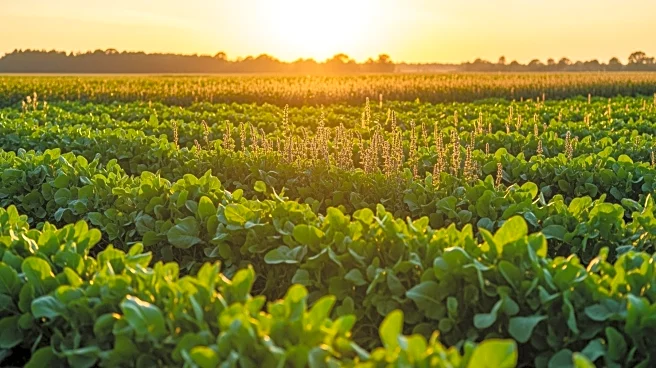What's Happening?
Modern Farmer has published an article detailing the benefits of high-yielding cover crops, which are essential for sustainable agriculture. These crops, including mustards, rye grass, buckwheat, cereal
rye, millet, oats, and field peas, play a crucial role in reducing soil erosion, improving soil health, and supporting biodiversity. Mustards, for instance, are noted for their ability to reduce plant diseases such as Verticillium in potatoes and root rots in beans and lettuce. Rye grass is highlighted for its nitrogen-fixing properties and quick decomposition, making it a valuable cover during cold seasons. Buckwheat attracts beneficial insects, while cereal rye prevents soil erosion and compaction. Millet offers weed suppression and soil coverage, and oats provide essential nutrients like nitrogen, phosphorus, and potassium. Field peas are recognized for their nitrogen fixation and resilience in poor soil conditions.
Why It's Important?
The use of cover crops is significant for the agricultural industry as it enhances soil fertility and reduces the need for chemical fertilizers, promoting more sustainable farming practices. By improving soil health and supporting biodiversity, these crops contribute to long-term agricultural productivity and environmental conservation. Farmers benefit from higher yields in subsequent planting seasons, while the reduction in plant diseases and pests can lead to lower production costs. Additionally, cover crops can help mitigate the impacts of climate change by improving soil carbon storage and resilience against extreme weather conditions. This approach aligns with the growing demand for organic and sustainable farming practices, which are increasingly important to consumers and policymakers.
What's Next?
Farmers are encouraged to integrate these cover crops into their planting strategies, considering regional climate conditions and soil needs. As awareness of sustainable agriculture grows, there may be increased support from government and agricultural organizations for the adoption of cover crops. Research into the specific benefits and applications of different cover crops is likely to continue, providing farmers with more tailored solutions for their unique environmental conditions. The agricultural industry may also see a shift towards more diversified cropping systems that incorporate these high-yielding cover crops, potentially leading to policy changes that support sustainable farming practices.
Beyond the Headlines
The adoption of cover crops has broader implications for food security and environmental sustainability. By enhancing soil health and reducing dependency on chemical inputs, cover crops can contribute to more resilient food systems. This practice also supports the conservation of natural resources and biodiversity, aligning with global efforts to combat climate change and promote sustainable development. As consumers become more environmentally conscious, the demand for sustainably produced food is likely to increase, encouraging more farmers to adopt these practices.











